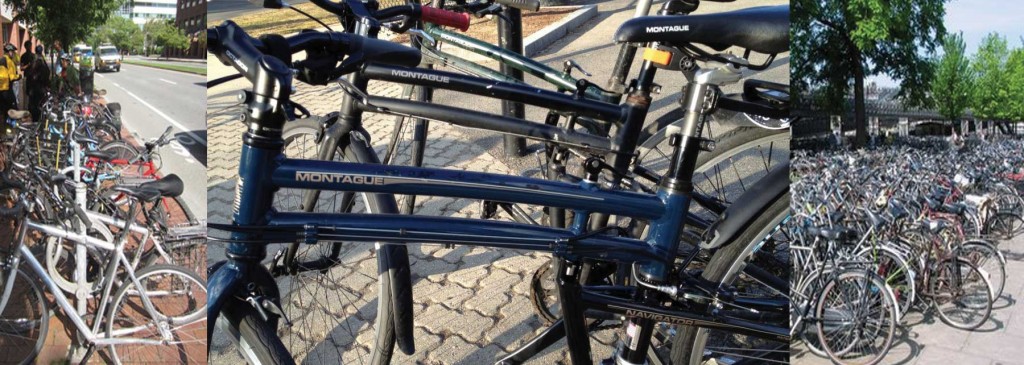Along with all the Olympics news coming out of London, there has been some cycling news outside of the races. Changes in the great historic city of London are reflecting a change in the times, away from the car-centered past and a turn toward a cycling-and-pedestrian-friendly urban future. We see this too in our fair city of Boston, where Mayor Menino has proclaimed that the car is no longer king. Here at Montague HQ, in Cambridge, MA which sits next to Boston, we offer further evidence toward the departure of the age of cars.
Changing Cities
In an article which ran in The Boston Globe last week, Eric Moskowitz documents the manifest benefits of car-free commuting; specifically referring to the radical changes observed in Kendall Square, Cambridge (also home to MIT). Over the past decade vehicle counts around Kendall have dropped by as much as 14 percent. This is not because the area is losing business or population. In fact the area has enjoyed immense commercial expansion over the past ten years, industrial commercial space has expanded by 40 percent.
We would expect all of this growth and development to mean more cars, not less. We would expect more traffic, more congestion, more fumes, more hassle – but this is not what we are seeing. The civic policy that has made this manifest change, Cambridge’s Parking and Transportation Demand Management Ordinance, has become something so startlingly successful that it is being studied by local and national urban planners.
The Ordinance requires that when businesses add parking, in either garage form or lot expansion, they must choose from an array of green transportation options for their employees to offset the impact of parking infrastructure expansion. These may include everything from subsidizing commute via public transit, shuttle bus services, to bicycle friendly services. Bicycle commuting services often include bike tune-up days, locker rooms with showers, and guaranteeing emergency rides for those who may need a car unexpectedly. Some companies even support this greener transportation initiative with monthly subsidies toward bicycle expenses.
Stephanie Pollack, of Northeastern University’s Dukakis Center for Urban and Regional Policy, in a comment for the article, notes that the boons of green-commuting have become part of the work-place culture in this area. A walking neighborhood offers increased patronage to local businesses.
In the summer months bicycle parking even becomes hard to come by. Indoor bicycle parking offered by many companies in this area are filled. Cycling to and from work is not a mark of the odd-man-out, but instead part of normal daily existence. The health benefits many professionals have experienced when changing commuting forms, be it adding cycling to the commute or increased walking have led to weight loss for some, or perhaps just a general improved outlook. Several note in the article how much money they are saving on parking and gas, just by riding.
Bike Sharing and Ownership
Another feature of the urban shift away from car-centric planning is the bicycle sharing program. Introduced in London, New York, and Boston – amongst others, bicycle sharing programs allow all the advantages of multi-modal transit to those who may not yet own a bicycle. The sharing program utilized in Boston, Hubway, is expanding into Cambridge, Somerville, and Brookline – neighboring cities which are part and parcel of the city’s thriving rhythm. Civic policy across the world is showing a commitment to cycling with the investment into these kinds of programs.
Cities are responding to the needs of people. Multi-modal transit, once just a far-fetched dream is, with each new demonstrably successful piece of civic planning, becoming the solid foundation upon which cities are being molded for the future. Individuals, businesses, and communities are seeing the benefits in the present. The future is unfolding into a time possessed of adaptive and flexible transit. We plan on navigating our city of the present, and our cities of the future, folded bike in hand. A bicycle that can go anywhere you go means you don’t have to miss out on anything.


